Related Research Articles
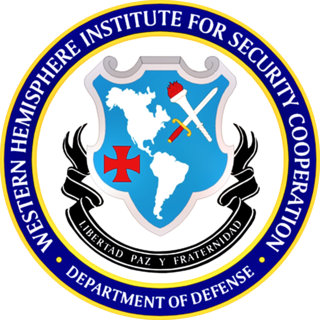
The Western Hemisphere Institute for Security Cooperation (WHINSEC), formerly known as the School of the Americas, is a United States Department of Defense school located at Fort Moore in Columbus, Georgia, renamed in the 2001 National Defense Authorization Act.

On October 2, 1968 in the Tlatelolco section of Mexico City, the Mexican Armed Forces opened fire on a group of unarmed civilians in the Plaza de las Tres Culturas who were protesting the upcoming 1968 Summer Olympics. The Mexican government and media claimed that the Armed Forces had been provoked by protesters shooting at them, but government documents made public since 2000 suggest that snipers had been employed by the government.
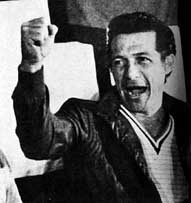
Roberto D'Aubuisson Arrieta was a Salvadoran military officer, neo-fascist politician, and death squad leader. In 1981, he co-founded and became the first leader of the far-right Nationalist Republican Alliance (ARENA) and served as president of the Legislative Assembly from 1982 to 1983. He was a presidential candidate for 1984 presidential election, losing in the second round to José Napoleón Duarte, the former president of the Revolutionary Government Junta. After ARENA's loss in the 1985 legislative elections, D'Aubuisson stepped down in favor of Alfredo Cristiani and was designated as the party's honorary president for life. D'Aubuisson was named by the United Nations' Truth Commission for El Salvador as having ordered the assassination of Óscar Romero, the archbishop of San Salvador in 1980.
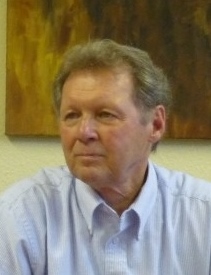
Roy Bourgeois is an American activist, a former Catholic priest, and the founder of the human rights group School of the Americas Watch. He is the 1994 recipient of the Gandhi Peace Award and the 2011 recipient of the American Peace Award and also has been nominated for the Nobel Peace Prize.

Dorothy Kazel, was an American Ursuline religious sister and missionary to El Salvador. On December 2, 1980, she was beaten, raped, and murdered along with three fellow missionaries – Maryknoll Sisters Ita Ford, Maura Clarke and laywoman Jean Donovan – by members of the military of El Salvador.
Carlos Mauricio was a professor of Agricultural Sciences at the University of El Salvador until his extrajudicial kidnapping by Salvadoran death squads in June 1983. He was tortured by the military under the command of then Minister of Defense, Gen. Carlos Eugenio Vides Casanova. On his release, he fled to the U.S., where his first job was as a dishwasher. He learned English and earned a graduate Certificate in Molecular Genetics, a teaching credential and an MA in Adult Education. In 2002, supported by the Center for Justice and Accountability, he won a lawsuit against General Vides Casanova for Casanova's command responsibility in Mauricio's kidnapping and torture. Mauricio was awarded significant punitive and compensatory damages against Vides Casanova. Vides Casanova is one of many Salvadoran human rights abusers with links to the notorious School of the Americas at Fort Benning, Georgia, and in 1985 was a guest speaker at the school.
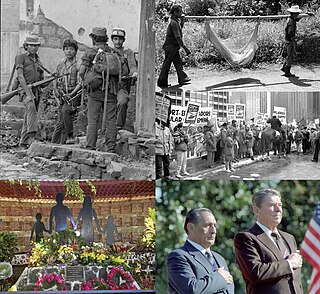
The Salvadoran Civil War was a twelve-year period of civil war in El Salvador that was fought between the government of El Salvador and the Farabundo Martí National Liberation Front (FMLN), a coalition or "umbrella organization" of left-wing groups backed by the Cuban regime of Fidel Castro as well as the Soviet Union. A coup on 15 October 1979 followed by government killings of anti-coup protesters is widely seen as the start of civil war. The war did not formally end until 16 January 1992 with the signing of the Chapultepec Peace Accords in Mexico City.
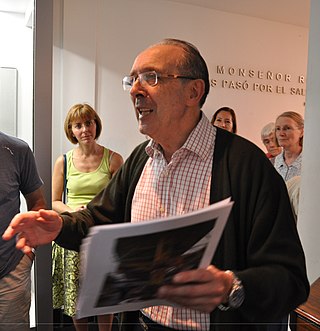
Jon Sobrino is a Jesuit Catholic priest and theologian, known mostly for his contributions to Latin American liberation theology. He received worldwide attention in 2007 when the Vatican's Congregation for the Doctrine of the Faith issued a notification for what they termed doctrines that are "erroneous or dangerous and may cause harm to the faithful."
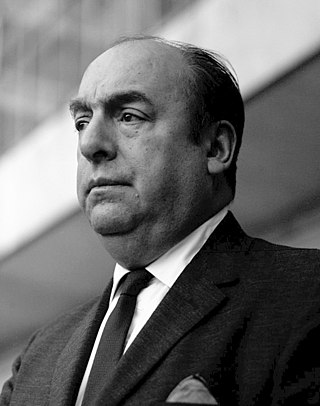
Pablo Neruda was a Chilean poet-diplomat and politician who won the 1971 Nobel Prize in Literature. Neruda became known as a poet when he was 13 years old and wrote in a variety of styles, including surrealist poems, historical epics, political manifestos, a prose autobiography, and passionate love poems such as the ones in his collection Twenty Love Poems and a Song of Despair (1924)...

Xiong Yan is a Chinese-American human rights activist, military officer, and Protestant chaplain. He was a dissident involved in 1989 Tiananmen Square protests. Xiong Yan studied at Peking University Law School from 1986–1989. He came to the United States of America as a political refugee in 1992, and later became a chaplain in U.S. Army, serving in Iraq. Xiong Yan is the author of three books, and has earned six degrees. He ran for Congress in New York's 10th congressional district in 2022, and his campaign was reportedly attacked by agents of China's Ministry of State Security.
Gwen Hennessey, O.S.F., is a Roman Catholic Franciscan Sister and peace activist, most widely known for her protests against the School of the Americas.
Dorothy Marie Hennessey, O.S.F., was a Roman Catholic Franciscan Religious Sister and activist involved with the Peace and Justice movement.
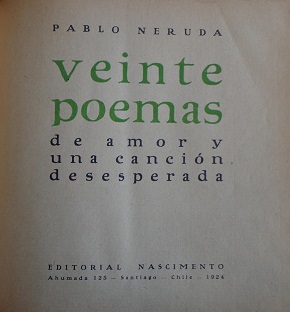
Twenty Love Poems and a Song of Despair is a poetry collection by the Chilean poet Pablo Neruda. Published in June 1924, the book launched Neruda to fame at the young age of 19 and is one of the most renowned literary works of the 20th century in the Spanish language. The book has been translated into many languages; in English, the translation was made by poet W. S. Merwin in 1969.
Alice Gerard is a journalist and peace activist who lives in Buffalo, New York.

The 21st anniversary of the 1989 Tiananmen Square protests and massacre began as a small march to commemorate the 1989 Tiananmen Square protests and massacre in Hong Kong. Hong Kong and Macau are the only places on Chinese soil where the 1989 crushing of China's pro-democracy movement can be commemorated, and the annual event to commemorate has been taking place in Hong Kong since 1990.
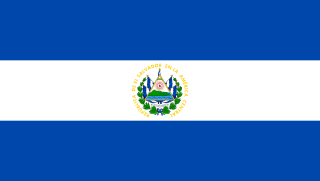
The Salvadoran military dictatorship was the period of time in Salvadoran history where the Salvadoran Armed Forces governed the country for almost 48 years from 2 December 1931 until 15 October 1979. The authoritarian military dictatorship limited political rights throughout the country and maintained its governance through rigged and fixed elections.

During the Salvadoran Civil War, on 16 November 1989, Salvadoran Army soldiers killed six Jesuits and two others, the caretaker's wife and daughter, at their residence on the campus of Central American University in San Salvador, El Salvador. Polaroid photos of the Jesuits' bullet-riddled bodies were on display in the hallway outside the Chapel, and a memorial rose garden was planted beside the chapel to commemorate the murders.

Lawrence "Larry" Rosebaugh was an American streetwise priest, peace activist, and missionary from Wisconsin who spent many years working in Central and South America and was murdered by masked gunmen in Guatemala in 2009.

The Truth Commission for El Salvador was a restorative justice truth commission approved by the United Nations to investigate the grave wrongdoings that occurred throughout the country's twelve year civil war. It is estimated that 1.4 percent of the Salvadoran population was killed during the war. The commission operated from July 1992 until March 1993, when its findings were published in the final report, From Madness to Hope. The eight-month period heard from over 2,000 witness testimonies and compiled information from an additional 20,000 witness statements.
General Williams Kaliman Romero is the former commander-in-chief of the Armed Forces of Bolivia. On 10 November 2019, he called for the resignation of President Evo Morales after a disputed election, amid ongoing protests. Morales was seeking a 4th term.
References
- ↑ "SOA Manuals". SOA Watch. Retrieved November 20, 2010.
- ↑ Patrick Mulvaney (November 28, 2005). "SOA Protests to Focus on Torture". The Nation . Retrieved November 20, 2010.
- ↑ Patrick Mulvaney (November 12, 2007). "SOA Protest Draws Scant Support From Candidates". The Nation. Retrieved November 20, 2010.
- ↑ Rosebaugh, Larry (2006). To Wisdom through Failure: A Journey of Compassion, Resistance and Hope. Washington, DC: EPICA. pp. 141–148. ISBN 0918346371.
- ↑ "The Jesuits Massacre Case: El Salvador: Justice for the Murders of November 16, 1989". The Center for Justice and Accountability. Retrieved November 20, 2010.
- ↑ The Jesuit massacre - The Hague Justice Portal. Retrieved November 20, 2010. Archived January 12, 2011, at the Wayback Machine
- ↑ "About SOA Watch". SOA Watch. Retrieved August 12, 2012.
- ↑ "Russian TV news crew arrested filming Ga. protest". The Boston Globe. Associated Press. November 22, 2010. Retrieved November 30, 2010.
- ↑ "School of the Americas Assassins". IMDb .
- ↑ "Will Work for Peace: New Political Poems".
- 1 2 "About Us". ¡Presente!. SOA Watch. Retrieved November 20, 2010.
- ↑ "More blood than ink: Edited extracts from Pablo Neruda: A Biography, by Adam Feinstein" in The Guardian Saturday July 3, 2004. Reprinted January 2005 in Lalkar Online at http://www.lalkar.net/2005/01/pablo-neruda-birth-centenary-year/